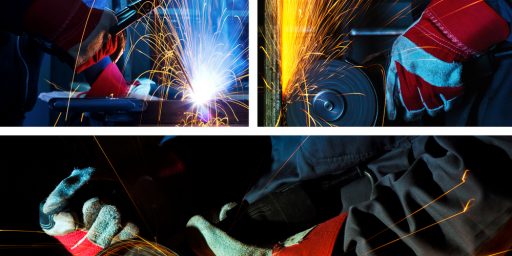Still More Problems With E-Voting
Via Chris Lawrence, it appears that a local GOP Senate challenger has filed an injunction to block electronic voting machines:
Bruni seeks an injunction to prevent the use of electronic voting machines due to what he deems is their unreliability.
“It’s very simple. All over the United States, there have been serious problems with the electronic voting machines,” Bruni said.
“This lawsuit is not against Webb County or Oscar Villarreal. It’s against the electronic voting machine.
“Anybody that wants to hurt either me or my opponent can very easily do it. I want the true voters’ intent to be heard.
I want the voters to make the decision, not somebody manipulating the machine or fraud.”
He may be on to something with respect to reliability as some early voters in West Virginia have reported that voting machines there have been switching their votes from Democratic candidates to Republican candidates–including the Presidential candidates.
hree Putnam County voters say electronic voting machines changed their votes from Democrats to Republicans when they cast early ballots last week.
This is the second West Virginia county where voters have reported this problem. Last week, three voters in Jackson County told The Charleston Gazette their electronic vote for “Barack Obama” kept flipping to “John McCain”.
[…]
Shelba Ketchum, a 69-year-old nurse retired from Thomas Memorial Hospital, described what happened Friday at the Putnam County Courthouse in Winfield.
“I pushed buttons and they all came up Republican,” she said. “I hit Obama and it switched to McCain. I am really concerned about that. If McCain wins, there was something wrong with the machines.
“I asked them for a printout of my votes,” Ketchum said. “But they said it was in the machine and I could not get it. I did not feel right when I left the courthouse. My son felt the same way.
I really fail to see why more and more jurisdictions are embracing electronic voting when e-voting really has serious problems in verifying votes. What’s wrong with paper ballots or optical scan, exactly?
UPDATE (James Joyner): Fully agree. I early voted in Virginia Friday afternoon using an electronic machine which produced no printout. The process gave me no reason at all to feel confident that 1) my vote counted or 2) that my vote went to the candidates I selected. In my particular case, I only had to vote on president, U.S. Senator, U.S. House, and a local bond initiative. It could have easily fit on one sheet of paper.
Image Credit: Steve Woods







You might mention that the problem with e-voting is the calibration often slips, it isn’t some concerted plot to steal votes. That was in the article you linked.
That said I am not a fan of any type of voting method that doesn’t involve a paper trail or the actual ballots cast.
I voted with pencil and paper in my war for the last 7 years. For the primary we apparently switched over to optical scan, and I had voted on optical scan in all the other states I lived in before this one. I like it-there is a clear mark that an election worker can’t change (if they were inclined to fraud) and is easily counted if a visual recount were necessary.
I do think one thing we as a nation need to grasp is that every method of voting is going to have an error rate-in every method of voting in some step of the process the process we use will produce some error. It might be human or it might be machine or some combination, but there is a difference between somebody intentionally skewing the votes in one direction and an unintentional error that is part of the process.
Errors happen-they aren’t always because some mean democrat or republican is out to steal your vote.
James – did you vote in Fairfax County? I voted early a week ago at the FC Government Center, and it was on a paper ballot that feeds into an OCR machine. I asked the poll workers if this iss what they will be using on election day vice the old electronic machines they used in 2004 and 2006. They said they’re going back to the OCR machines, I assume so they can keep a paper trail of the marked ballots.
The WVa machine problem is that certain touch screens are notoriously bad at “losing their place” and have to be recalibrated so that the touch lands in the right location.
If a machine visibly “switches votes” during the voting process, you can be certain it is not a hack.
Several points. First, the rush to fully electronic voting machines was a panic move after the 2000 elections. It was instigated and abetted by the Congress. The states are unlikely to have begun the en masse move on their own for budgetary reasons if for no other.
Second, there are certain limited cases in which fully electronic voting machines are a good idea. They are generally speaking more adaptivizable than mechanical or mark sense machines are and that makes them more accessible to people with special needs. That suggests to me that they should remain available but they shouldn’t be the way that everybody votes.
Finally, in our election judge training here in Chicago we were all but instructed to discourage the use of the touch screen for all but people mobility or vision issues. In my precinct at the last election 98% of the people preferred using the mark sense approach they’ve become accustomed to.
Or you could just go the pen and paper route, which has almost no problems and is cheaper to boot … I really don’t understand why there are any kind of voting machine. Voting machines which don’t give you a slip of paper should be illegal.
I do think that miscalibration in the case of the West Virginia ballots is more likely than a “hack”, but my point is that the things are unreliable.
Ink is cheap too, and finger prints solves the I don’t have a I.D. Garbage.
Pen and paper are easier to game than electronic machines. The people demand a fast accurate count. To do that you need electronic.
It can be done right, and it’s up to the local and state officials to demand that it is done right.
To avoid the crap that was flying over the past eight years, Florida has gone back to a paper ballot. Elections are being held not only for federal office, but a lot of local offices as well as several amendments to the state constitution. They all fit on the front and back of a single sheet.
I’ll be early-voting later today.
Our machines have a little window where you can see your paper printout as you vote (I voted on Saturday). I changed my vote on one proposition, for example, and I saw the multiple lines “vote no,” “vote no cancelled,” “vote yes,” as they went past.
Are there really that many different kinds of touchscreen machines? All of the ones I’ve used in the past few years had that little window.
To the best of my knowledge there are only two manufacturers of voting machines: Diebold (they’re calling the voting machine division something else now) and Sequoia. There are undoubtedly multiple models within each line.